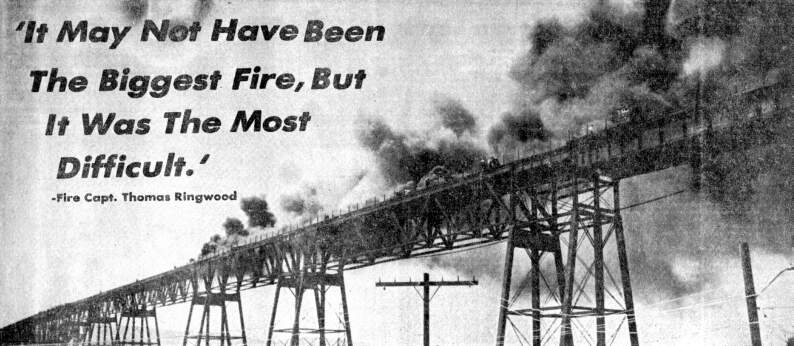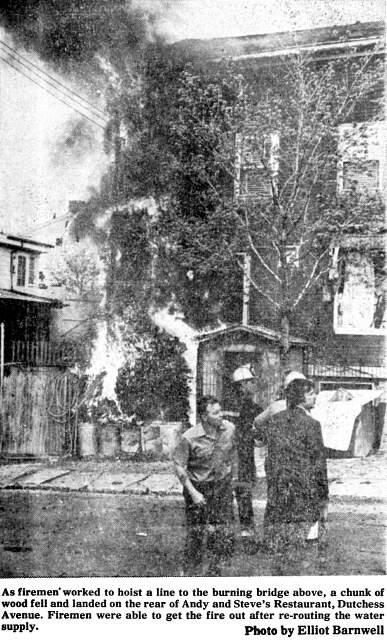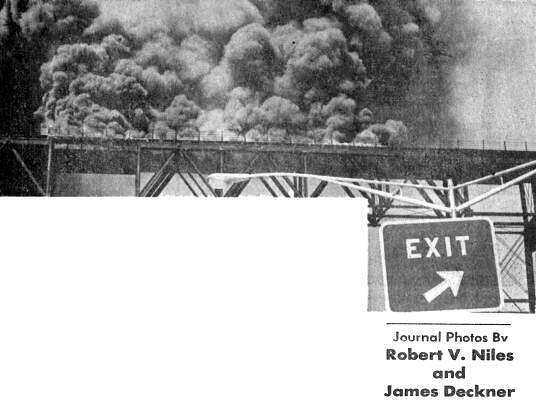|
'The bridge was Moving'

 By LARRY HUGHES, By LARRY HUGHES,
Journal Staff Writer
It was 2:08 o'clock on a sunny afternoon when the first clouds
of ugly, black smoke began pouring from the Poughkeepsie Railroad
Bridge.
And it was not until eight hours later that the efforts of
125 firemen were able to contain a fire that started by slowly
working across the span.
It may not have been the biggest fire we've ever had in the
city," said Fire Capt. Thomas Ringwood. But it was the most
difficult."
Falling embers and burned out railroad ties fell from the bridge
during the afternoon touching off a fire at Andy & Steve's
Restaurant, Dutchess Avenue, and numerous grass fires.
Train traffic along the Penn Central tracks was slowed. Crowds
formed along both banks of the river to watch.
No injuries were reported.
Fire officials said the fire was caused by a freight train
that passed over the bridge at 12:42 o'clock.
'Probably A Spark'
"It was probably the hot box or a spark that did it,"
said Ringwood. "At 1:17 we had a small fire on the tracks
at Washington Street that was put out quickly. Then our department's
van cruised along underneath the bridge down to Dutchess Avenue
looking for anything else they didn't spot anything."
Just after 2 p.m. Mrs. Barbara Dubraski, 9 Dutchess Ave., saw
some smoke on the bridge.
"It was just some smoke, just a little," she said.
"Then it started to spread and my neighbor called in a fire
alarm."
Capt. Ringwood was home, having worked the overnight shift.
"I was listening to fire radio as the men went to the
fire," he said. "I heard them talking about having trouble
getting water going into the water pipe-line up there on the tracks.
I knew we were in for trouble."
Ringwood said that pipe was broken in two or three areas. The
system is designed for fire fighting. In case of fire, hoses link
the city water system to the pipe and there is available water
on the bridge.
There wasn't available water on the bridge Wednesday.
"Penn Central had informed us it wasn't operating right,"
said Ringwood. "They were to have made repairs. But that
was in mid-March. "
Ringwood went out on the bridge and took over the end of the
operation from Capt. Robert Vaughn.
'All I Could See…'
 "All I could see was fire
and smoke," he said. "The thick black smoke was caused
by a surfacing material they coated the wood ties and timber to
prevent rotting." "All I could see was fire
and smoke," he said. "The thick black smoke was caused
by a surfacing material they coated the wood ties and timber to
prevent rotting."
The immediate problem was to get water up to the bridge where
the fire was moving toward the city side.
Trucks were set up on Dutchess Avenue, a rope lowered, and
a two and half inch fire hose hoisted up 250 feet, by hand. The
switches were thrown and the system worked.
"Your average water pressure is about 125 pounds,"
said Capt. Jack Nugent. "We had 320 pounds of pressure to
get it up there."
Before that water could be sent up to the bridge, Capt. Ringwood
saw the tavern catch fire from chunks of burning debris. There
was a delay while firemen on the ground extinguished that fire.
Police had been called out on traffic control. The arterial
was closed down and the streets in the area underneath the bridge
were roped off.
While Ringwood and his squad of eight men on the bridge waited
for water they created a fire break by tearing up planks.
"We had to stop that fire from spreading over those homes,"
said Ringwood. "But to tear up those ties. didn't leave us
much to walk on. It was kind of breezy up there too."
Then the wind shifted and the fire moved toward the river,
spreading 50 feet in 15 minutes.
When the fire fighting should have become easier it became
dangerously more difficult. The fire was moving out over the Central
Hudson facility on Water Street.
'Really Worried'
 "I looked down and saw what
we were faced with," said Ringwood. "We had three 115,000-volt
lines, three 69,000-volt lines and then, under that, four 30,000
gallon propane gas storage tanks. To put it mildly, we were really
worried the whole thing would go." "I looked down and saw what
we were faced with," said Ringwood. "We had three 115,000-volt
lines, three 69,000-volt lines and then, under that, four 30,000
gallon propane gas storage tanks. To put it mildly, we were really
worried the whole thing would go."
Capt. Tom Armstrong was in charge of the men who went to the
Central Hudson facility.
"They had cooling devices in the, gas tanks and they were
doing the job," he said. "Central Hudson was great.
They cooperated in every way. They cut power on those higher powered
lines. We had men on the tanks with hoses as a back up. We brought
two ladder tanks under, the bridge and fed them with pumpers so
we had two streams of water going up. Some of the guys were walking
around the tanks putting out grass fires from embers."
Highland firemen had the first good luck of the day. The bridge
pipeline on their end worked and they had water going on the fire.
The spread was slowed.
"They came all the way across to us," said Ringwood
of the Ulster County firemen. "It was a long way out. One
of my men walked up to one of theirs and said 'Welcome to Poughkeepsie.'"
Mrs. Dubraski finally got through to her husband at work and
he hurried home.
"It must have been so frustrating for those firemen not
being able to get at it right away," she said standing in
front of her house, her face smeared with smoke and spent embers.
"I put out two or three little fires in the back here. I
felt better when I sent my son up the hill away from this."
Firemen were getting the upper hand on the bridge fire but
conditions up top were getting extremely hazardous.
'Bridge Was Moving'
"We got to the point where I told the men I wouldn't order
them to go out any further," said Ringwood. "The bridge
was moving a little when it swayed about eight feet and we just
sort of stopped and looked at each other thinking it might come
down any minute."
 But the firemen kept going out.
A rescue worker from LaGrange walked up to Ringwood out on the
bridge and, volunteered his services saying he had had climbing
experience. But the firemen kept going out.
A rescue worker from LaGrange walked up to Ringwood out on the
bridge and, volunteered his services saying he had had climbing
experience.
"It was a helluva job all around," said Ringwood.
"It was guys taking risks and doing their job and then some.
There was some luck involved too. But the training and experience
came together. If there hadn't been water in the Highland side
of the bridge pipeline it might still be burning. If there had
been more wind or if this had been a hot day in August those tanks
might have gone."
When it was over the three chiefs, with a total of 93 years
of fire fighting experience, sat around Ringwood's kitchen table.
The air was that of thankfulness a tragedy had been averted and
the good sense of having done the job.
"One thing I thought of out there," said Jack Nugent,
"was how, in the past, no matter how bad a fire was Tom would
always say 'we've never had a fire get across the river on us.'
It would always stop at the river no matter how bad it got. That
almost changed Wednesday. Whoever thought we'd get a fire up there."
Ringwood said, "Was it Chicken Little who said the sky
is falling?"
Poughkeepsie Bridge | Bridge
Page | Contents Page
|







